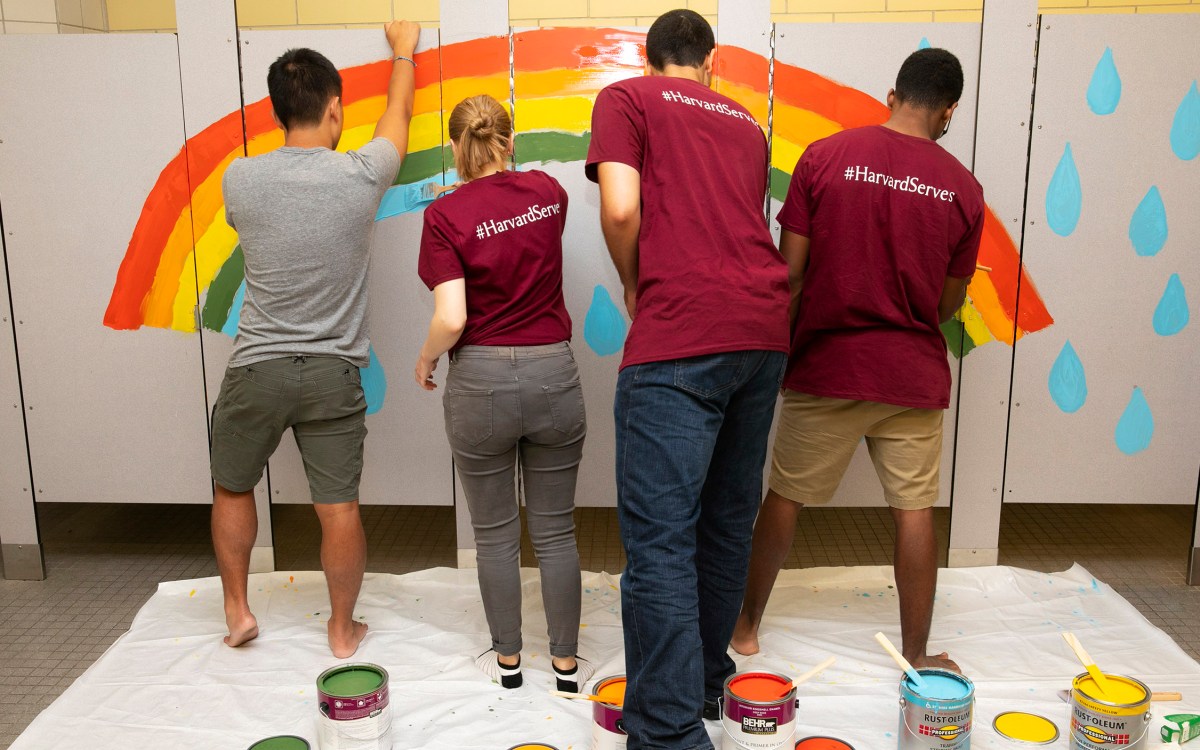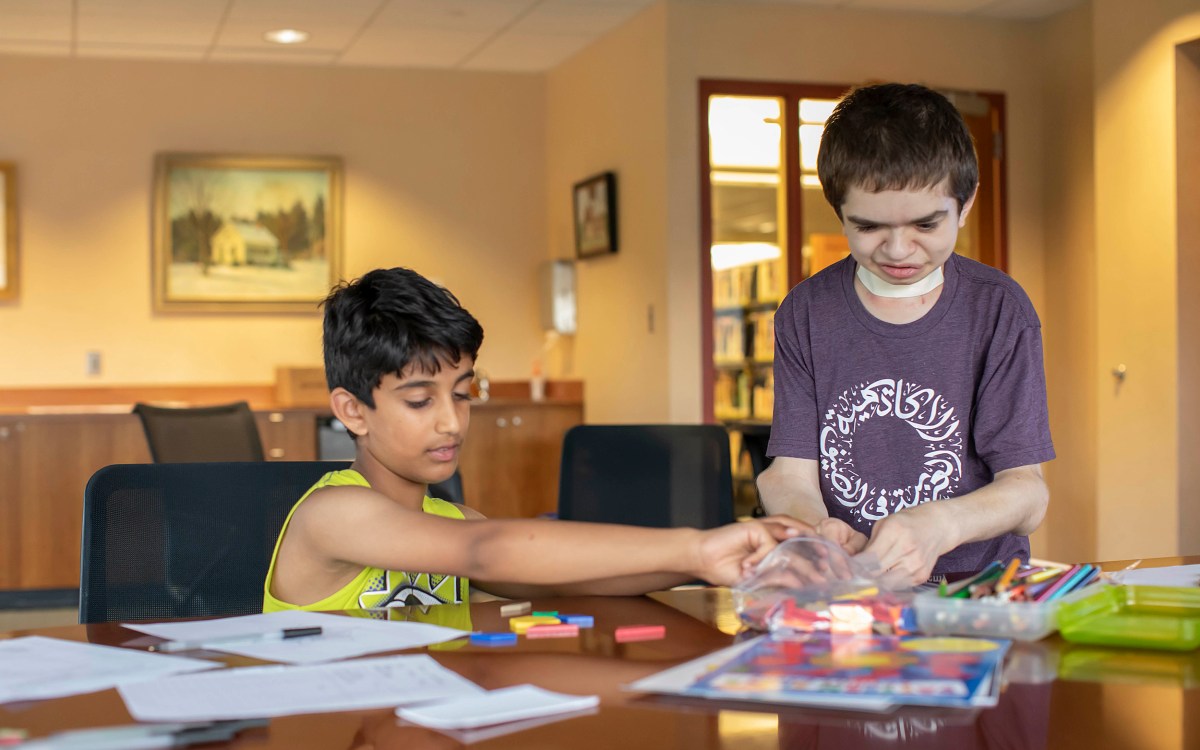A SPARK of an idea
110 first-years spent a month implementing their own public service projects
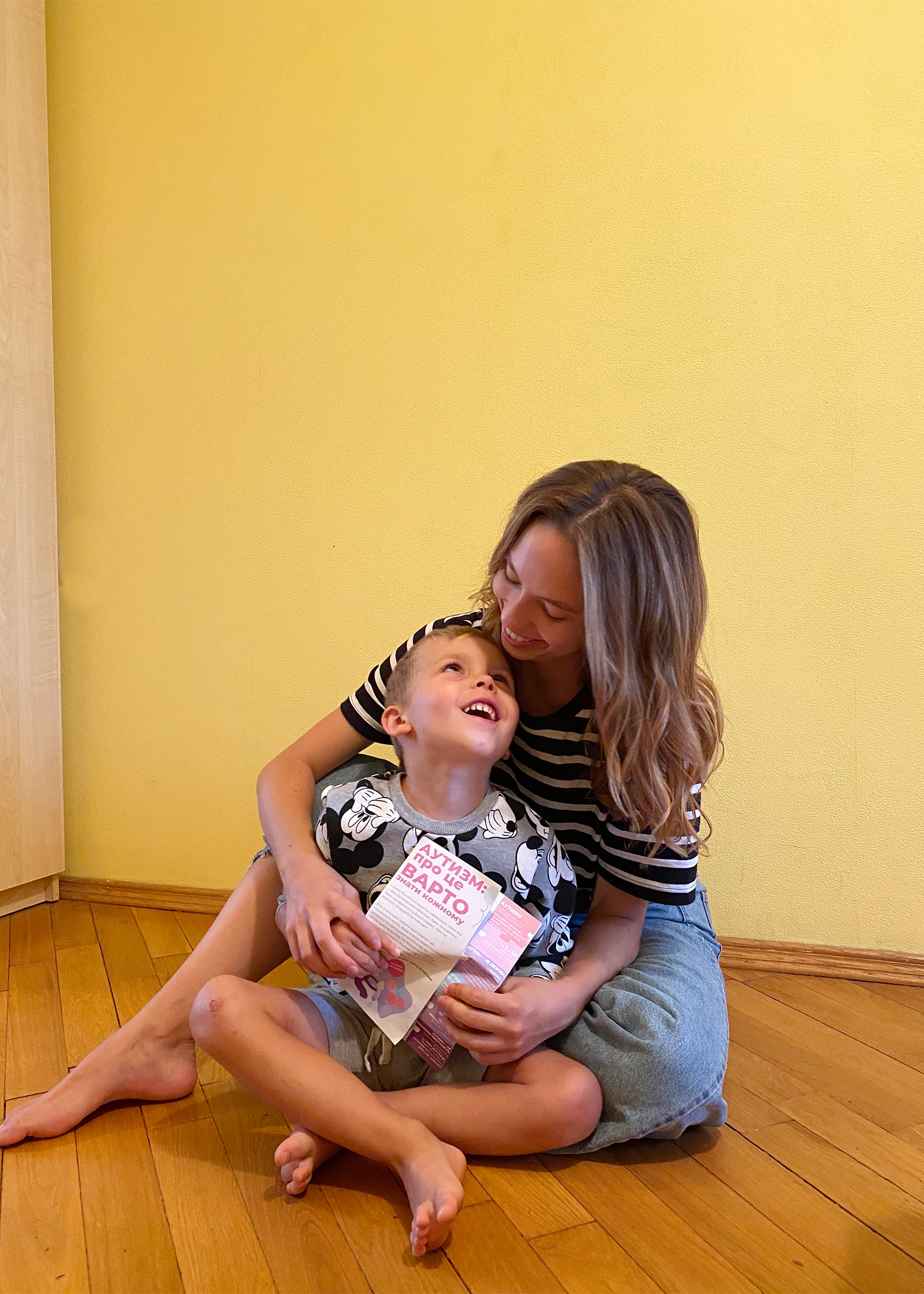
Nika Rudenko’s project was motivated by her 4-year-old nephew, who has autism, and her family’s fight for resources.
Photo courtesy of Nika Rudenko
For the second year, incoming first-year students had the opportunity to participate in SPARK (formerly Service Starts with Summer), a public-service program based in their hometowns. Run by the Phillips Brooks House Center for Public Service and Engaged Scholarship at Harvard College, SPARK let each student propose a summer project dedicated to a service area about which they were passionate. Participants spent 100 hours on their projects, including training and online community-building activities with their cohort, and received a $1,500 stipend. This year, 110 first-years participated, and the Gazette spoke to nine about their projects.
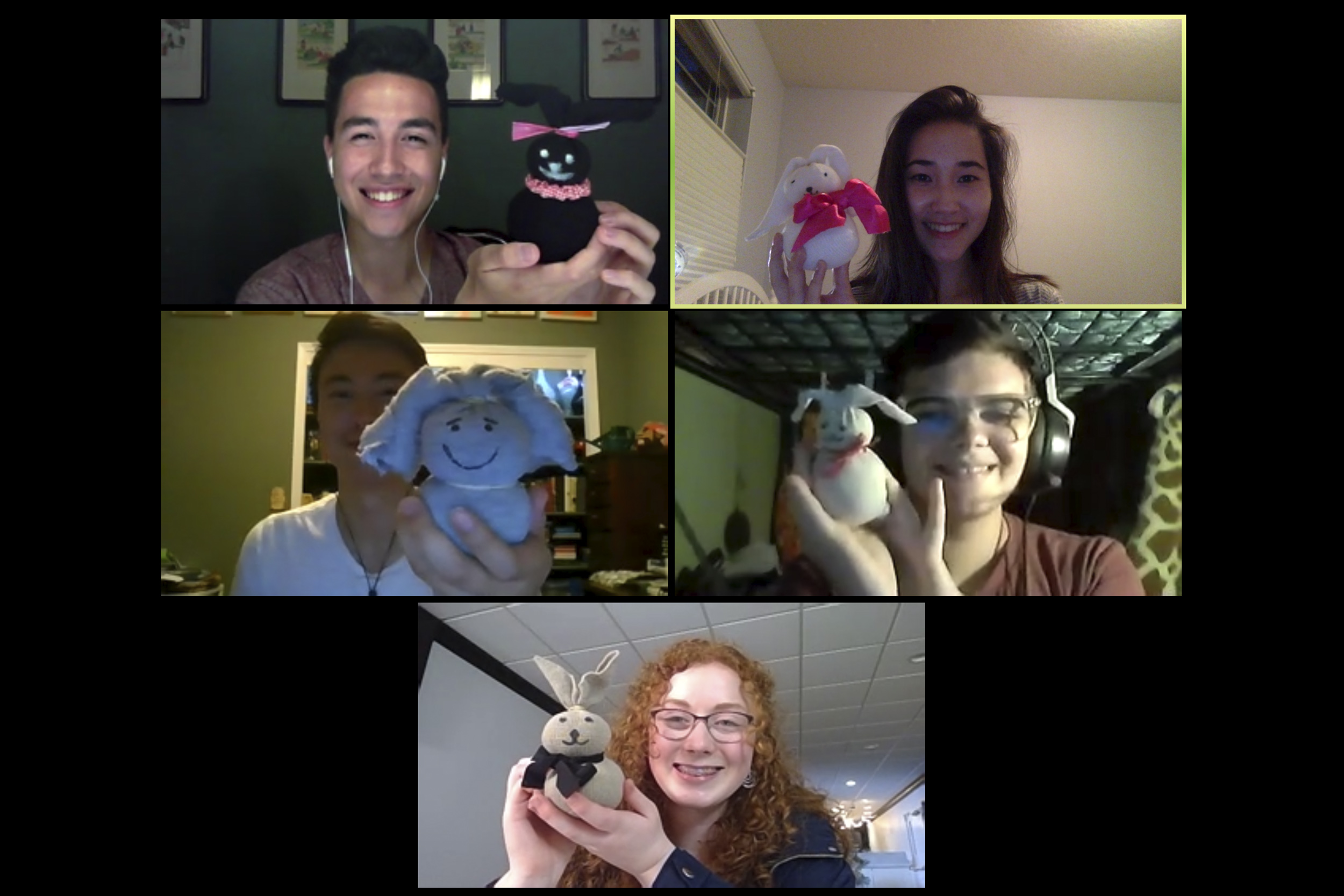
Ethan Myers (upper left) and other artists showing off homemade sock bunnies.
Photo by Ethan Myers
Ethan Myers
Beaverton, Ore.
A dancer and civic activist, Ethan Myers created Virtual Artists, a free virtual summer arts program in his hometown that engaged both his love of the arts and his commitment to helping his peers give back to their communities. He recruited young artists, craftspeople, and performers around the area to teach 52 classes during the month of July in subjects including TikTok dances, music production, and the art of the sock bunny. Each small class comprised about seven elementary and middle school-aged children from all over the area and around the world.
Myers also solicited donations for Planting Seeds, a local community organization supporting residents experiencing financial insecurity or eviction. By the end of the program, Virtual Artists had raised $5,200 for Planting Seeds.
“I look at the arts as a wonderful, creative outlet that is disappearing from our world especially due to COVID, [with] funding that is being cut and all the classes that are being cancelled. It’s really heartbreaking to see,” said Myers. “With Virtual Artists, anyone could join. Everybody can start somewhere with the arts.”
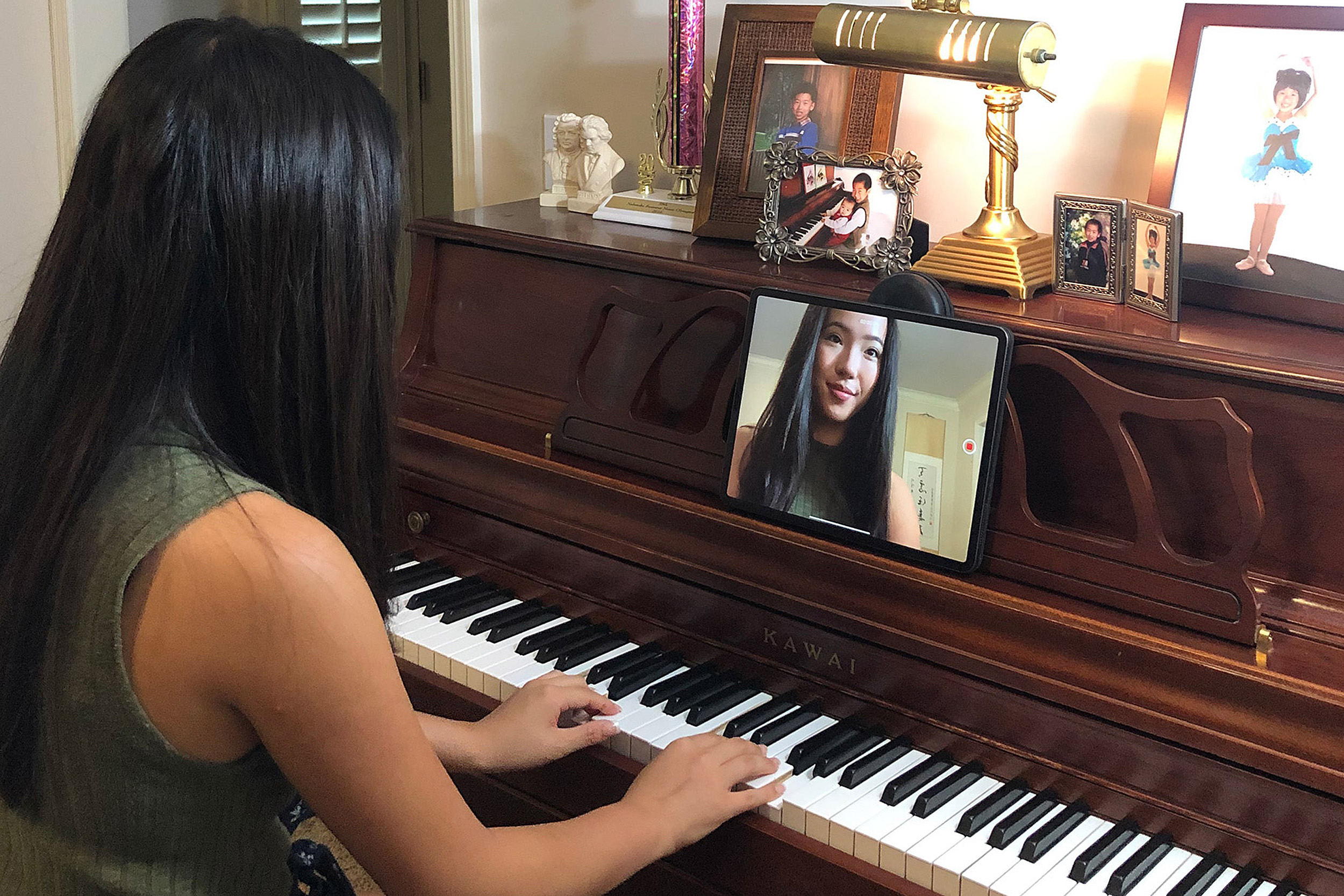
Lucy Tu recording a piano piece for her students.
Photo courtesy of Lucy Tu
Lucy Tu
Omaha, Neb.
As a longtime volunteer with Special Musicians, Lucy Tu was excited to continue working with the organization through SPARK. Her normal music lessons at a community center in Omaha were upended in the spring, and Tu pivoted to Zoom for a summer of weekly hourlong gatherings with kids of all ages with special needs. About 10 students took part each week.
“I’ve firsthand seen how impactful COVID-19 has been on education, [but] for students who have disabilities, this impact on education is amplified,” Tu said, pointing out that many students with disabilities are immunocompromised and schools are often the only place they can meet with therapists and aides.
To adapt her lessons to a virtual music room, Tu created digital flashcards about notes and scales and made short recorded teaching videos for songs like “Chopsticks.” She hopes that the organization can continue to use those resources once she leaves for college. She kept one feature from her in-person gatherings: the dance party that ended every lesson.
“I’ve always been passionate about music and seen music as a [way] to connect,” she said. “I wanted to create [a] virtual music curriculum in hopes of helping the students find the stability that I think is especially necessary during this pandemic.”
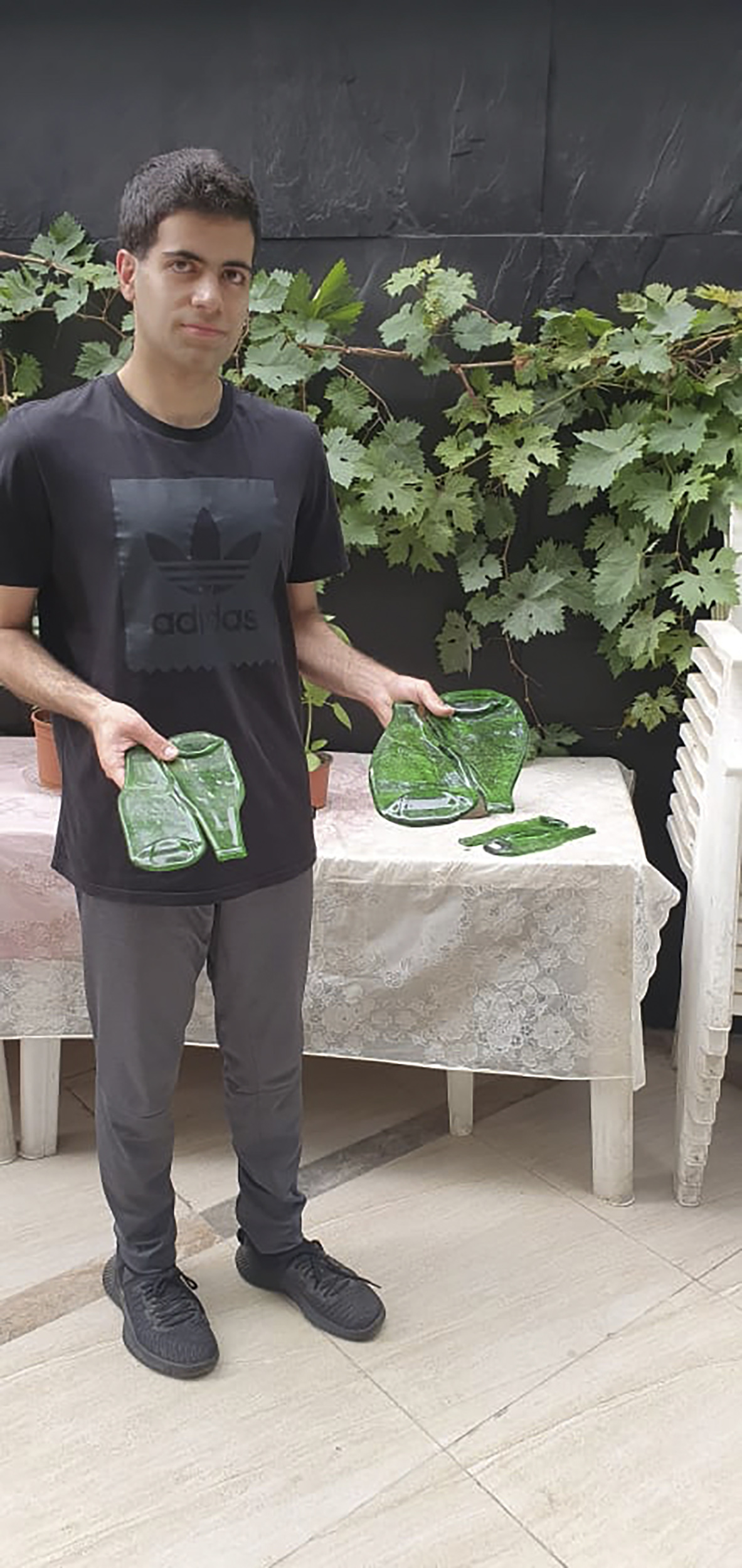
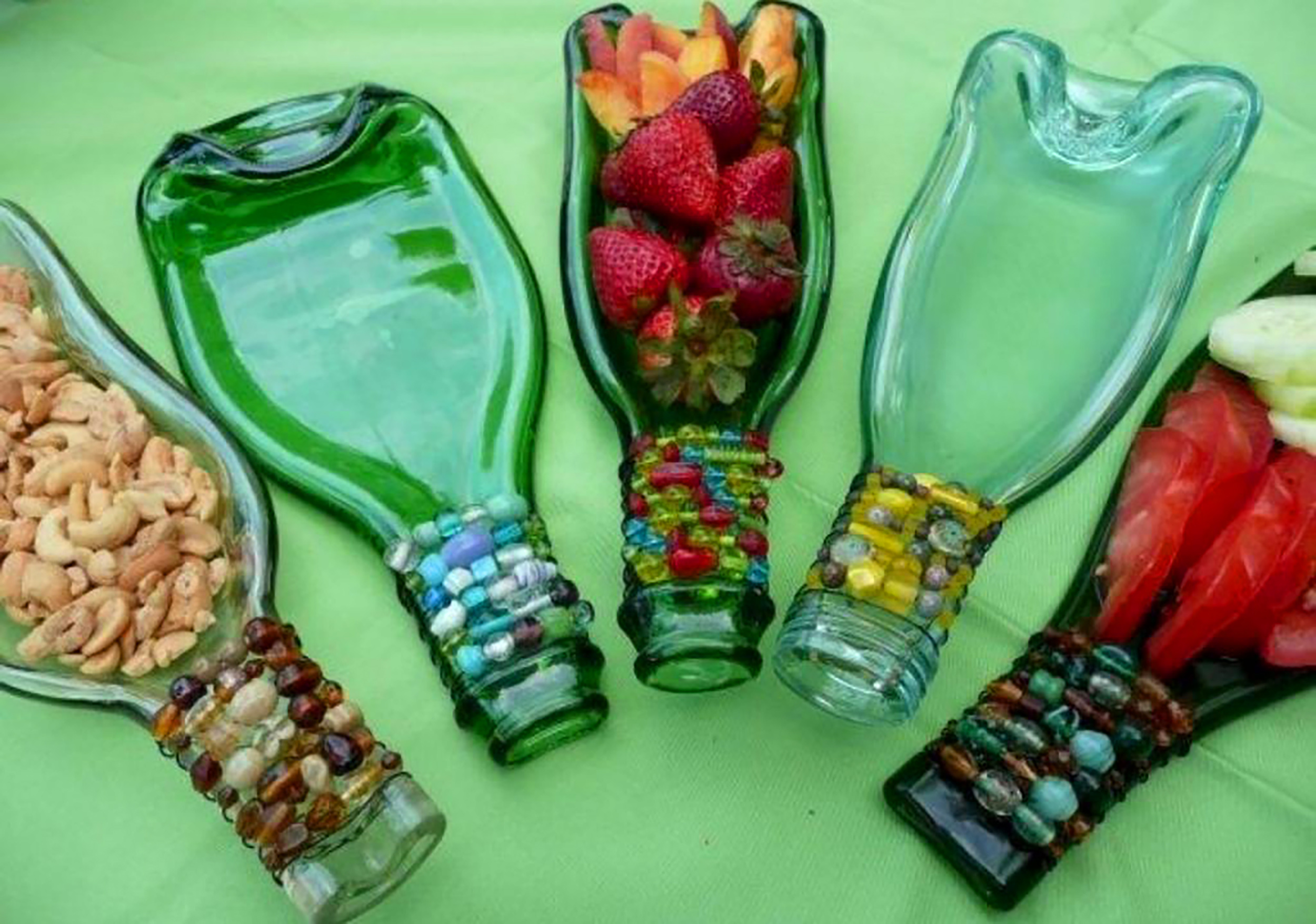
Gabriel Khoury with repurposed glass bottles, remade into small serving trays.
Photos courtesy of Gabriel Khoury
Gabriel Khoury
Beirut
For most of his high-school career, Gabriel Khoury worked to improve sustainability efforts in his hometown, and he loved to engage other young people along the way. This summer, Khoury harnessed those organizing skills to recruit young volunteers, a local engineering firm, and the municipal government in Beirut to join his SPARK campaign, i-Recycle.
Khoury and the team designed a system with multiple categories for better waste processing, and collected glass bottles, plastic shopping bags, and large plastic buckets from more than 1,000 households around the city that otherwise would have been sent to landfills. The glass bottles were incinerated, and the material used to make household items like trays and bowls. The team used sewing techniques to turn shopping bags into wall hangings and placemats, and distributed the buckets to low-income households to use as planters for rooftop gardens.
At the same time, Khoury and his colleagues surveyed residents to understand the roadblocks that kept them from participating in recycling programs, with the aim of bringing the results to the city government.
“We’ve been able to work with over thousands of households living in Beirut,” said Khoury, whose mission has taken on new urgency following the devasting human and environmental effects of the August 4 ammonium nitrate explosion in the city’s port. “The fact that we’re able to develop a social impact and to have an influence is something that really matters to me.”
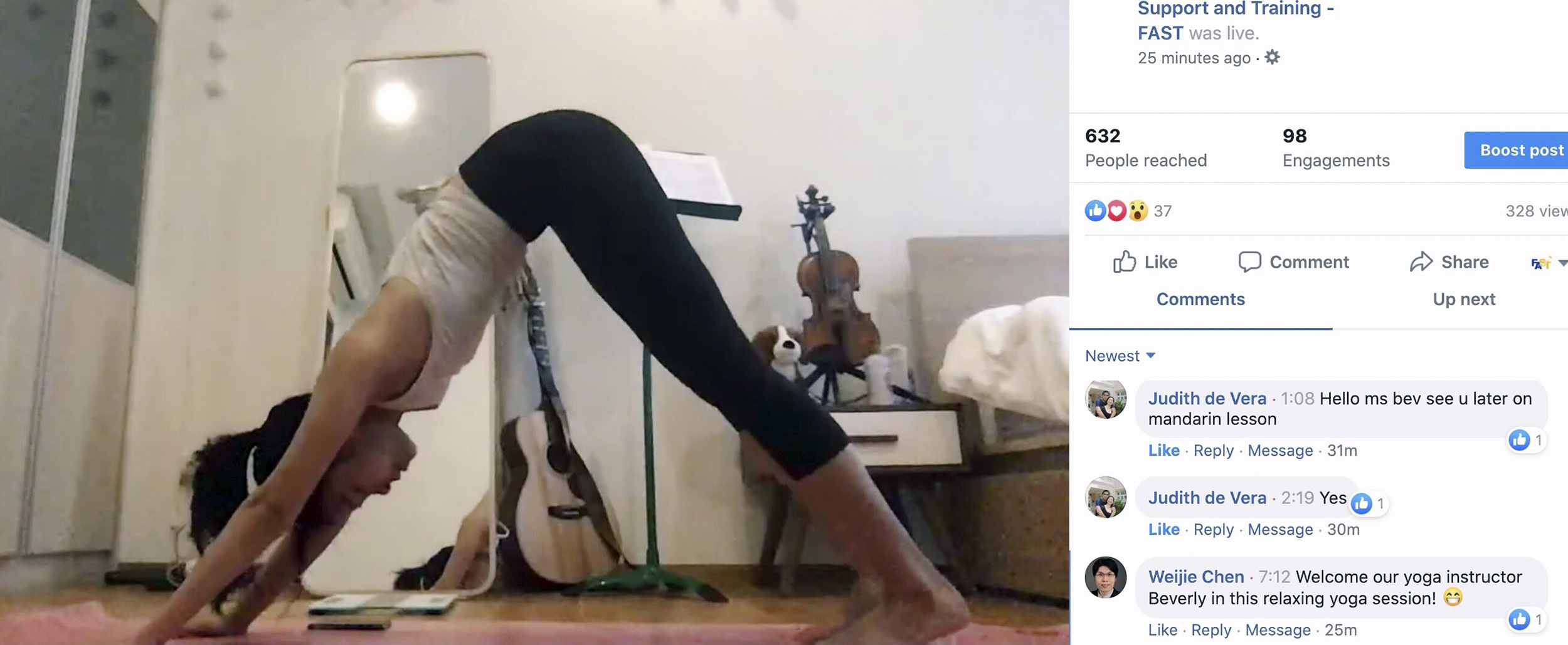
Beverly Fu leads a virtual yoga class on Facebook.
Photo courtesy of Beverly Fu
Beverly Fu
Singapore
Despite the uncertainty and fear of the COVID-19 pandemic, Beverly Fu felt lucky to be with her parents and three siblings during a strict stay-at-home order in Singapore. But she knew that thousands of live-in domestic workers in the country were less fortunate; most were locked down with their employers, with few rest days and a significantly heavier workload, and unable to go home to their own families in Indonesia, Myanmar, the Philippines, and other countries.
For her SPARK project, Fu reached out to leaders at the Foreign Domestic Worker Association for Social Support and Training (FAST), an organization that supports domestic workers through legal services, an emergency hotline, and skills training. With the support of FAST, Fu started teaching a new, intensive Zoom course in Mandarin, as well as a weekly yoga class on Facebook Live for workers to gather and destress.
“When I was stuck in quarantine, to get out of my own headspace I [tried to] stop thinking so much about myself and more about what greater problems other people had,” said Fu. “Foreign domestic workers are one such group of people who do not have the privilege of being surrounded by their own families at home and who are confined to their workplaces 24/7. Being isolated with one’s employers in such a way can lead to elevated levels of workplace stress.”
The process was not without its challenges. The diversity of the workers’ backgrounds and languages (including Bahasa, Burmese, and Tagalog) required Fu to pay close attention to simplicity and clarity when teaching, and many workers could not attend class regularly due to their employers’ schedules. But for Fu, every gathering was an opportunity for learning and connection, including lesson breaks where some students broke out instruments and chatted with each other.
“They’re very enthusiastic learners, which I really appreciate and admire,” said Fu. “The fact that they’re eager to learn after a laborious day of work speaks volumes about their level of perseverance.”
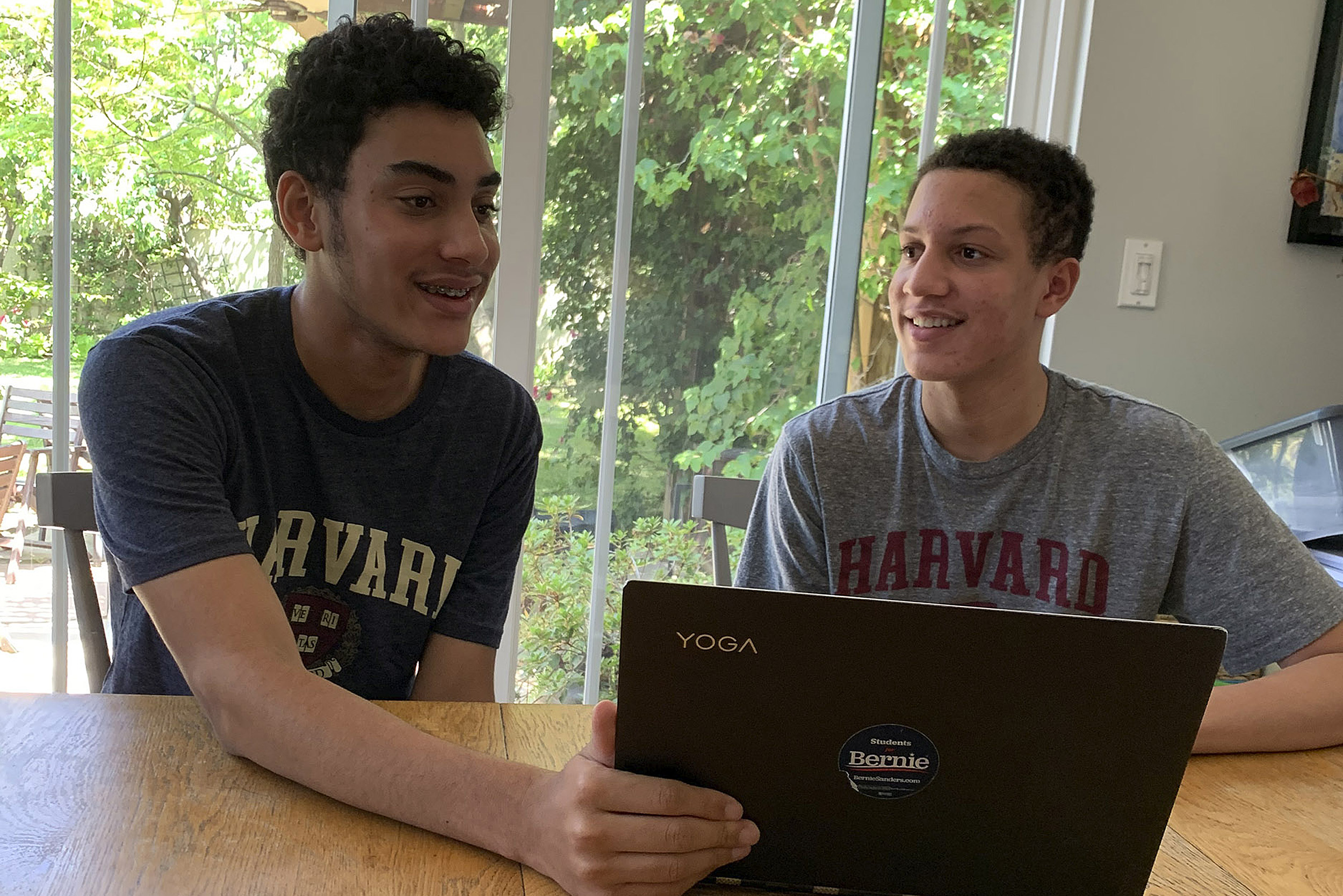
Photo courtesy of Julian and Adin Handler
Julian Handler and Adin Handler
Los Angeles
Julian and Adin Handler applied their experience working on political and civic campaigns to develop an educational program on COVID-19 for the communities hardest hit by the pandemic. The twins focused their attention on the Black community in Los Angeles, where residents have died from the virus at almost double the rate of white people.
“I’ve been interested in and feeling disgusted and upset by [racial] health disparities for a while, and at the start of the COVID-19 pandemic I’d been reading about health disparities in the Black community,” said Julian. “That made us want to do something about the problem.”
Working with their mentor, Eva M. McGhee, an assistant professor at Charles R. Drew University of Medicine and Science, the brothers worked with leaders of Black churches to find out what information and resources their congregants needed most to dispel myths and provide accurate information about COVID-19. They created a virtual presentation and made a booklet detailing ways churchgoers can help stop the spread of the virus.
“You [can] read about the disparities in different communities, and you see that African Americans are five times more likely to get coronavirus, but it feels different when you’re actually talking to people and understanding why that is,” said Adin. “It feels really good be making a positive impact and working to change that.”
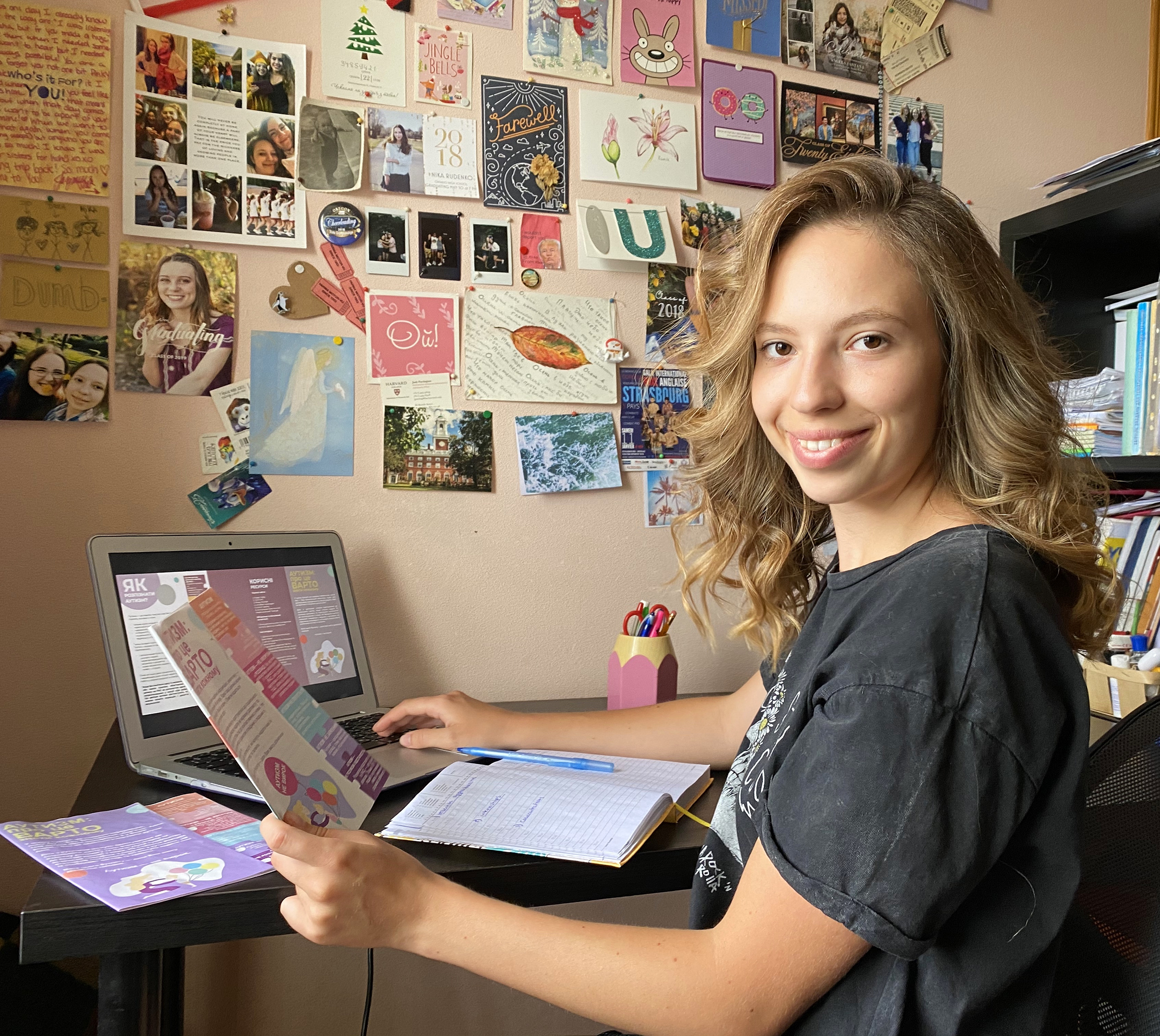
Photo courtesy of Nika Rudenko
Nika Rudenko
Donetsk, Ukraine
Nika Rudenko’s project was motivated by her 4-year-old nephew, who has autism, and her family’s fight for resources and community acceptance of his condition.
“It was extremely difficult for my brother and his wife to find doctors and specialists who could work with them, and they just didn’t have enough resources to understand” autism spectrum disorder and how to best support their son, said Rudenko, speaking from Kyiv, where her family moved in 2014. “I thought that maybe many people had the same experience with ASD and since he was diagnosed, I have been thinking about how to create an informational campaign to raise awareness around the issue.”
SPARK offered Rudenko an opportunity to put her plans into action. Working with the Ukrainian nonprofit Happy Today, which helps parents who have autistic children, she and her friend Diana Sobolieva created a booklet full of accessibly written, evidence-backed information about the myths and realities of autism. The booklet also contains a road map for parents to follow after diagnosis, with a list of support resources.
Rudenko also met with representatives from the Ukrainian Ministry of Health in a first step toward distributing the booklet to hospitals and doctors’ offices. She hopes this approach will help reach families during the diagnosis process, especially those who might not have reliable internet access or are getting misinformation online. And she’s received positive feedback from those she’s trying to reach.
“The person who helped me with editing told me that she wished our brochure existed when her child was first diagnosed,” said Rudenko. “I hope my project will support many families who encounter ASD on their life path and yield many more positive outcomes.”
Photo courtesy of Zoree Jones
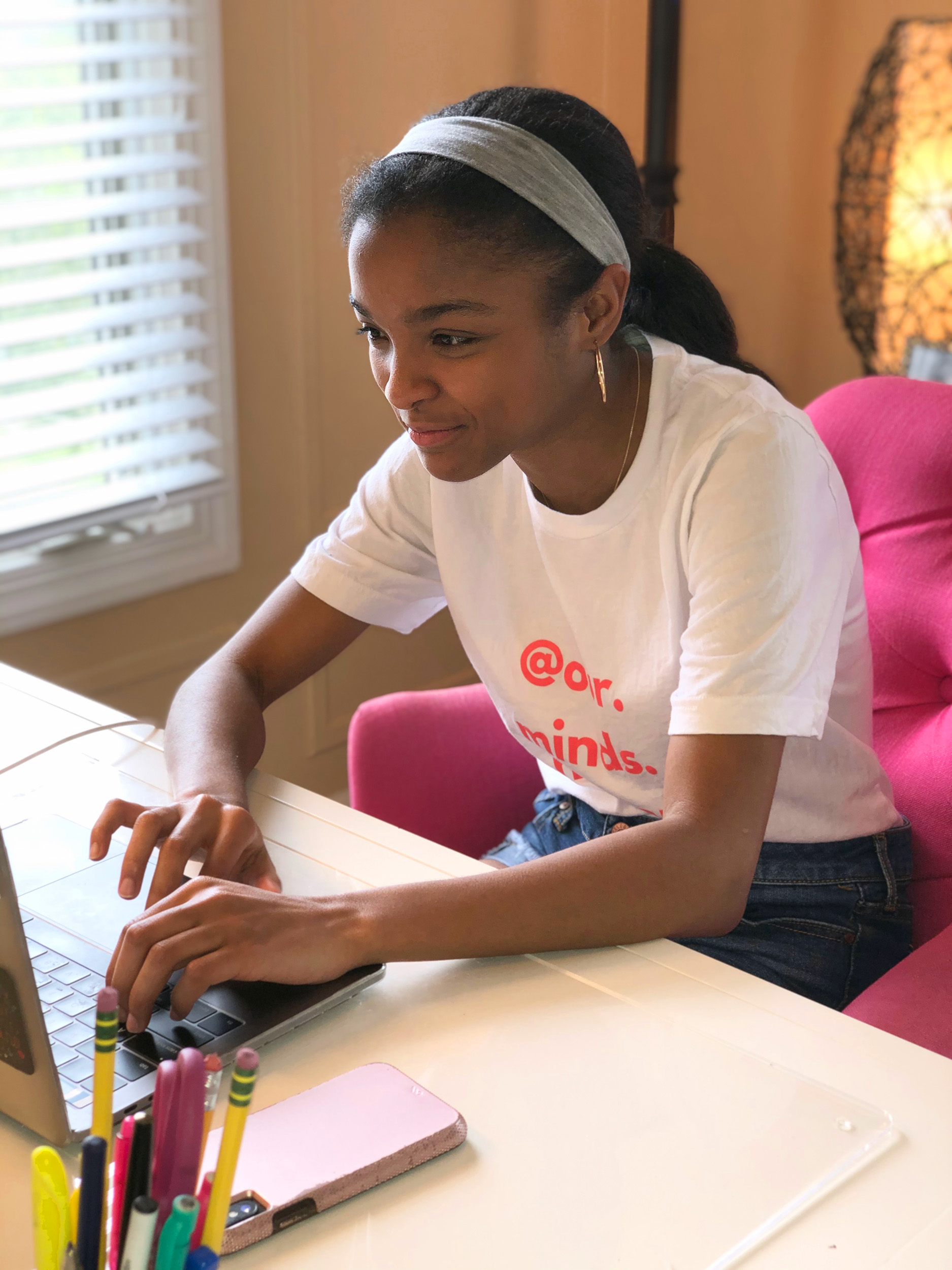
Zoree Jones
Gainesville, Va.
“Leaving high school, my biggest question was, ‘How can I continue the work that I’ve been doing with mental health advocacy going forward?’” said Zoree Jones, who spent her summer working with two youth mental health organizations. “The biggest thing that spoke to me about SPARK was the opportunity to really learn more about the public service program at Harvard while also remaining deeply connected to my own community.”
Jones had been working to end the stigma around mental illness with the suicide prevention nonprofit Josh Anderson Foundation and its high school mental wellness program, Our Minds Matter, for two years before the COVID-19 pandemic cut short her senior year. She knew that teens in her area and around the country needed assistance more than ever once schools closed, so for the month of July, she held weekly “Wellness Wednesday” sessions over Zoom on topics like self-care and mindfulness.
Jones also designed a wellness program with local youth empowerment nonprofit Promote Care Prevent Harm for a new initiative called COVID-19 Safety Corps, which aims to educate youth about mental health awareness during the pandemic.
She said that helping her peers through the uncertainty and stress of the pandemic was one of the most rewarding parts of her work in mental health advocacy.
“Student leadership is really important in empowering other students to realize they can do this as well,” said Jones. She wanted “to provide them with the resources and the support that they need to create change in their own lives, in their own communities, and on their own terms.”
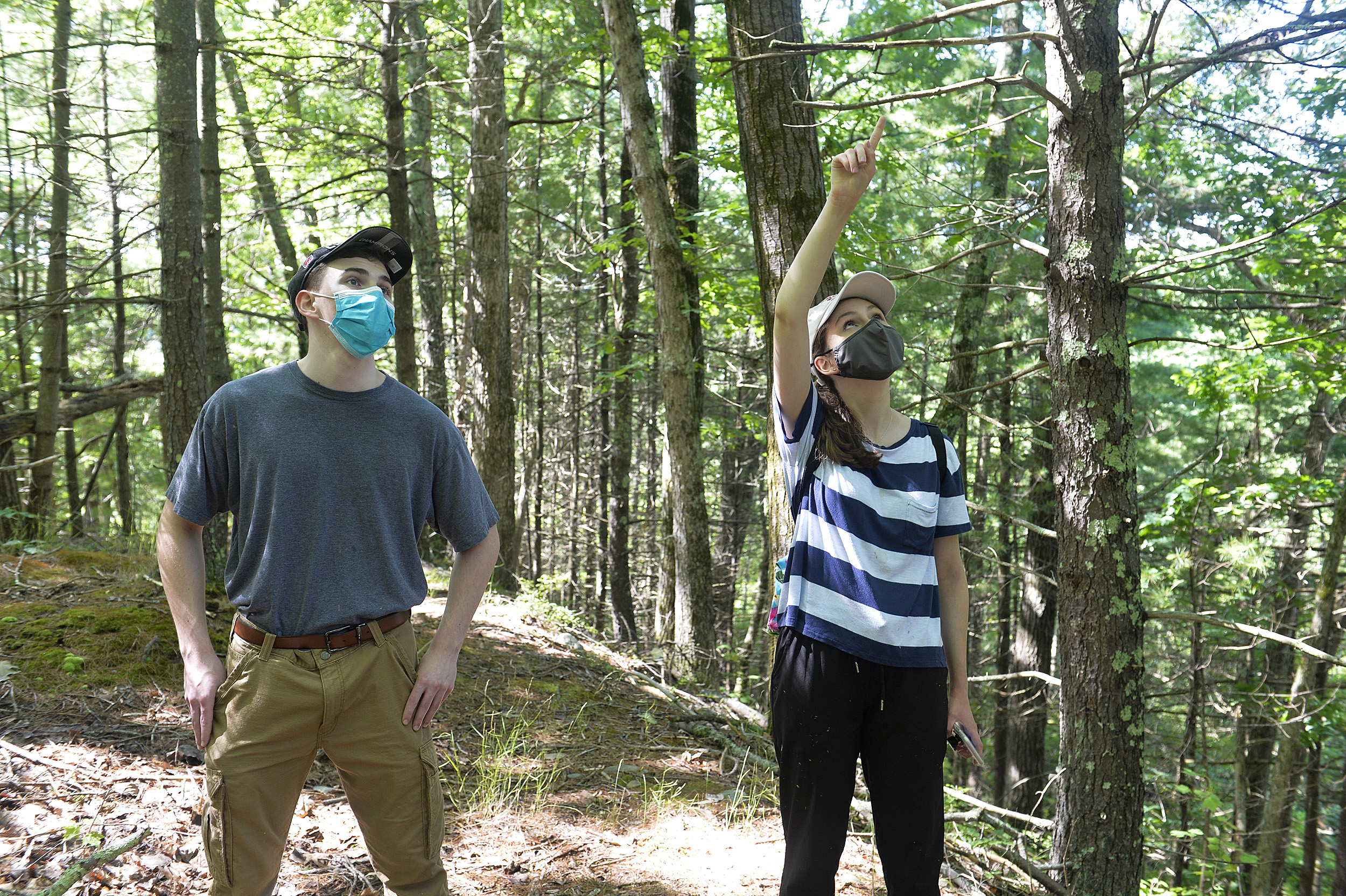
Kate Guerin (right) draws her brother Drew’s attention to a specific tree at the Taplin Wildlife Sanctuary in Groton.
Jon Chase/Harvard Staff Photographer
Kate Guerin
Groton, Mass.
Kate Guerin has spent most of her life traversing the 1,400 acres of preserved natural area in her hometown that are maintained by the nonprofit Groton Conservation Trust. This summer, she got a much more intimate view of the GCT’s 40 properties as an inventory volunteer.
Guerin began work in June after some training with the trust’s ecology and preservation experts. She spent hours walking along pond edges, through forests, and across fields identifying invasive species like common buckthorn (Rhamnus cathartica) and Tatarian honeysuckle, and monitoring porcupine dens and other animal habitats. She used apps such as iNaturalist and Survey 123 to catalog and upload her findings to the trust’s master database for future conservation management projects and more accurate tracking of climate change effects on the local wildlife behaviors.
After learning so much about the plant and animal life in her town, “I look much more closely at the different plants and types of water marshes and ponds,” she said. “I’ve never had such a hands-on approach to this kind of work before, and I’ve definitely been more inspired to pursue environmental science in the future.”



